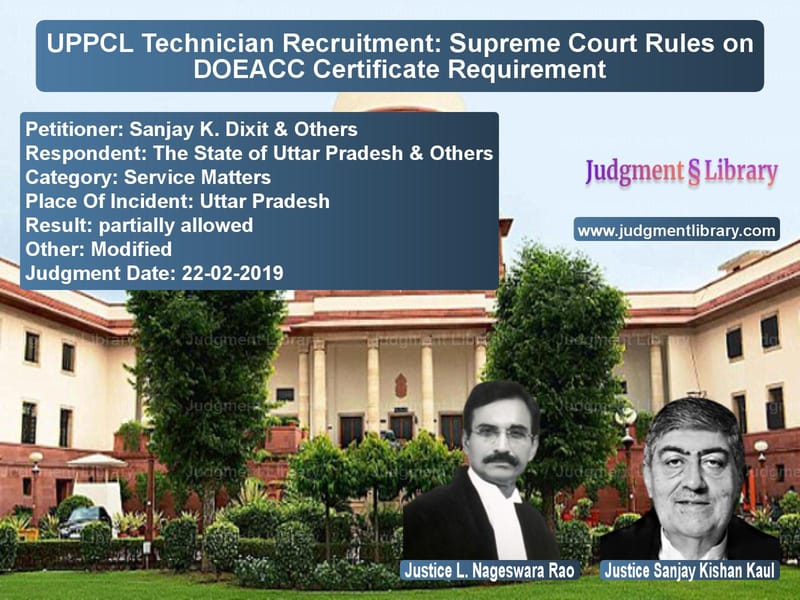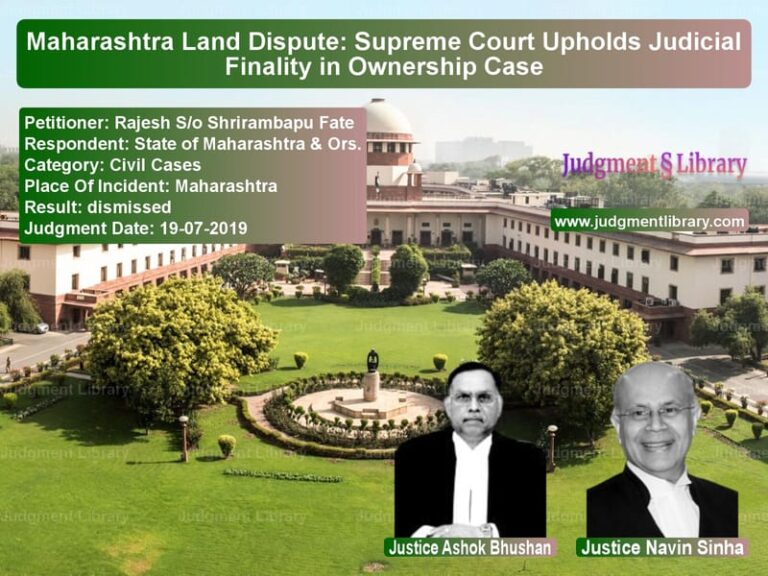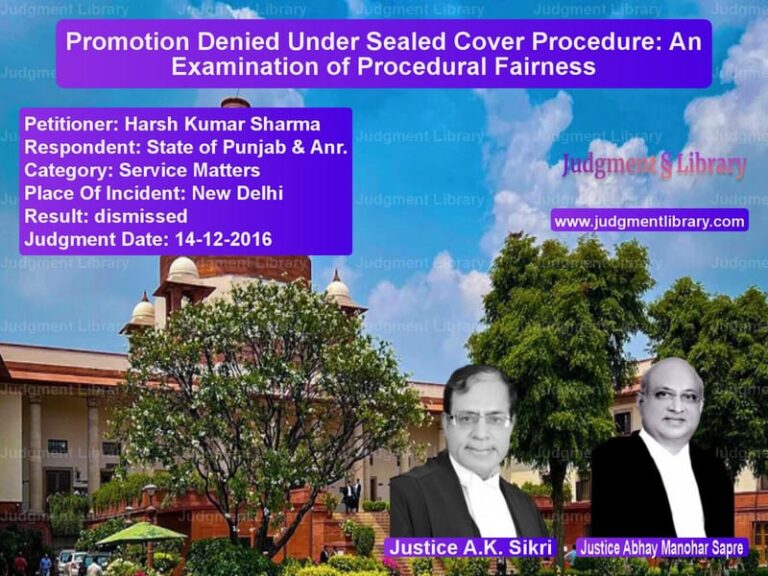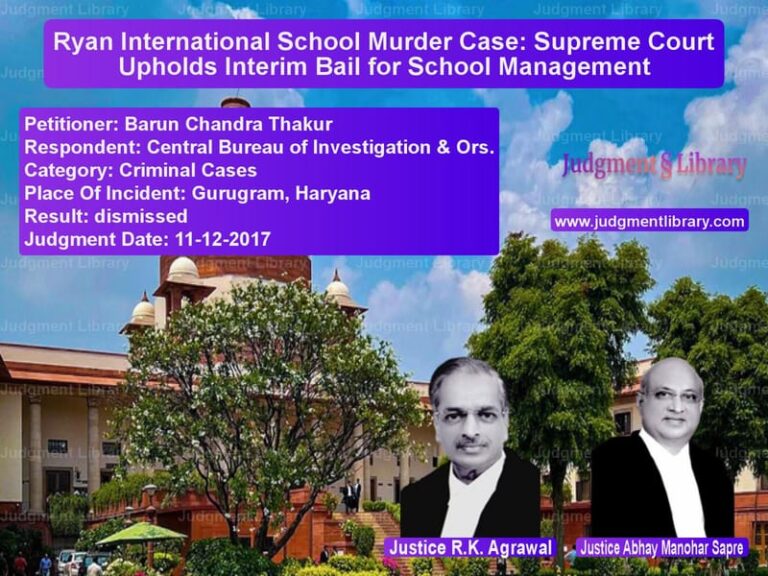UPPCL Technician Recruitment: Supreme Court Rules on DOEACC Certificate Requirement
The Supreme Court of India recently delivered a ruling in the case of Sanjay K. Dixit & Others v. The State of Uttar Pradesh & Others, addressing the selection and appointment of candidates for Technician Grade-2 (Apprenticeship Electrical) in the Uttar Pradesh Power Corporation Limited (UPPCL). The judgment clarifies the requirement of a DOEACC Course on Computer Concept (CCC) certificate for candidates and sets an important precedent on changes to selection criteria during recruitment.
Background of the Case
On March 4, 2011, the Electricity Service Commission of Uttar Pradesh issued an advertisement inviting applications for 2,974 vacancies for the post of Technician Grade-2 (Apprenticeship Electrical). The eligibility criteria required candidates to have:
- A two-year National/State-level professional certificate in Electrician Trade.
- A High School certificate from the Uttar Pradesh Board or an equivalent qualification with Science and Mathematics.
- A DOEACC CCC certificate at the time of the interview.
A total of 16,712 candidates applied, and after a written examination on August 7, 2011, 6,218 candidates qualified. The interview process, conducted between November 28, 2011, and December 28, 2011, saw several candidates unable to produce their DOEACC certificates.
Extension of DOEACC Certificate Submission Deadline
Due to a delay in the issuance of DOEACC certificates, the Chairman and Managing Director of UPPCL permitted candidates to participate in the interview, provided they submitted their certificates within three months. However, only candidates who submitted their certificates before March 28, 2012, were deemed eligible for selection.
Subsequently, recruitment was halted due to a government-imposed ban. After representations from candidates, UPPCL extended the certificate submission deadline by another three months, allowing candidates to submit their DOEACC certificates by July 31, 2012.
Legal Challenges and High Court Verdict
Several unsuccessful candidates challenged the selection process in the Allahabad High Court, arguing that:
- Relaxing the requirement of producing the DOEACC certificate at the interview stage was illegal.
- The relaxation was not mentioned in the advertisement, leading to an unfair advantage for certain candidates.
- The selection list should be revised to exclude candidates who did not produce the certificate at the time of the interview.
The High Court ruled that candidates who submitted their certificates before March 28, 2012, were eligible but those who produced them after the deadline should be excluded.
Arguments Before the Supreme Court
Petitioners (Selected Candidates)
- The extension for DOEACC certificate submission was granted due to genuine delays in certificate issuance by DOEACC.
- Once the selection process was complete and appointments made, reversing the decision would unfairly harm selected candidates.
- Many candidates had already been working for years, and removing them from service would be unjust.
Respondents (Unsuccessful Candidates)
- UPPCL’s decision to extend the deadline was illegal as it changed the rules of selection after the process had begun.
- The original advertisement required submission of the DOEACC certificate at the time of the interview, and relaxation of this requirement was discriminatory.
- Only those who met the original requirements should have been selected.
Supreme Court’s Observations
The Supreme Court ruled that:
- The DOEACC CCC certificate was a mandatory requirement.
- Relaxing this requirement mid-selection without public notice violated Articles 14 and 16 of the Constitution.
- “When a particular schedule is mentioned in an advertisement, the same has to be scrupulously maintained. There cannot be any relaxation unless such power is specifically reserved.”
- However, since DOEACC delayed certificate issuance, candidates who submitted their certificates before March 28, 2012, should not be penalized.
Final Verdict
The Supreme Court upheld the High Court’s ruling, concluding:
- Candidates who submitted their certificates by March 28, 2012, were validly selected and could continue employment.
- Those who submitted certificates after March 28, 2012, were ineligible and would be removed from service.
- UPPCL’s decision to extend the deadline to July 31, 2012, was invalid.
Key Takeaways
- Strict Compliance with Recruitment Rules: Selection criteria must be adhered to, and post-facto relaxations are not permissible unless explicitly stated.
- Importance of Timely Documentation: Candidates must ensure they meet all eligibility conditions at the time of selection to avoid disqualification.
- Judicial Oversight in Public Recruitment: The judiciary plays a crucial role in ensuring fairness and preventing arbitrary modifications in selection criteria.
Conclusion
The Supreme Court’s ruling reinforces the principle that government recruitment processes must be transparent and consistent. While acknowledging the difficulties faced by candidates due to external delays, the judgment ensures that the integrity of the selection process is maintained, balancing fairness with administrative necessity.
Petitioner Name: Sanjay K. Dixit & Others.Respondent Name: The State of Uttar Pradesh & Others.Judgment By: Justice L. Nageswara Rao, Justice Sanjay Kishan Kaul.Place Of Incident: Uttar Pradesh.Judgment Date: 22-02-2019.
Don’t miss out on the full details! Download the complete judgment in PDF format below and gain valuable insights instantly!
Download Judgment: Sanjay K. Dixit & Ot vs The State of Uttar P Supreme Court of India Judgment Dated 22-02-2019.pdf
Direct Downlaod Judgment: Direct downlaod this Judgment
See all petitions in Recruitment Policies
See all petitions in Employment Disputes
See all petitions in Public Sector Employees
See all petitions in Judgment by L. Nageswara Rao
See all petitions in Judgment by Sanjay Kishan Kaul
See all petitions in partially allowed
See all petitions in Modified
See all petitions in supreme court of India judgments February 2019
See all petitions in 2019 judgments
See all posts in Service Matters Category
See all allowed petitions in Service Matters Category
See all Dismissed petitions in Service Matters Category
See all partially allowed petitions in Service Matters Category







